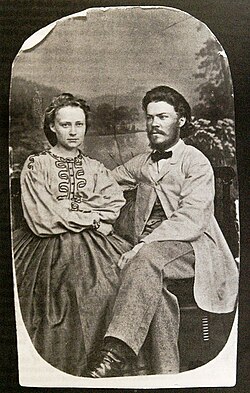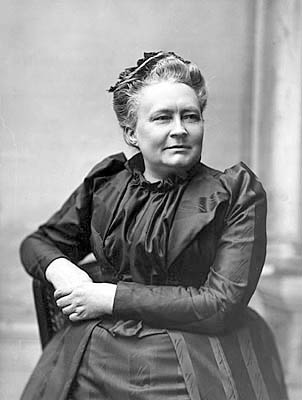
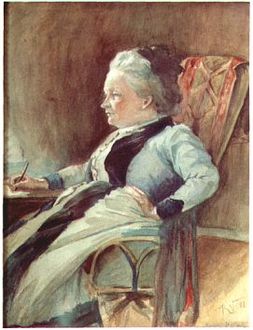
مينا كانت
من ويكيبيديا
| مينا كانت | |
|---|---|
| (بالفنلندية: Minna Canth) | |
| معلومات شخصية | |
| اسم الولادة | (بالسويدية: Ulrika Wilhelmina Johnsson) |
| الميلاد | 19 مارس 1844 تامبيري |
| الوفاة | 12 مايو 1897 (53 سنة) كووبيو |
| سبب الوفاة | نوبة قلبية |
| مكان الدفن | كووبيو |
| الإقامة | تامبيري (–1853) كووبيو (1853–1863) يوفاسكولا (1863–مارس 1880) كووبيو (مارس 1880–) |
| مواطنة | فنلندا |
| عدد الأولاد | 7 |
| الحياة العملية | |
| المهنة | كاتِبة، وصحفية، وكاتبة مسرحية، وسيدة أعمال، ومحرِّرة[1] |
| اللغات | السويدية، والفنلندية[2] |
| التوقيع | |
| المواقع | |
| الموقع | الموقع الرسمي |
| IMDB | صفحتها على IMDB |
مينا كانت (Minna Canth؛ تامبيري، 19 مارس 1844 – كووبيو، 12 مايو 1897) كاتبة وناشطة اجتماعية فنلندية. بدأت كانت الكتابة أثناء إدارتها لمتجر العائلة للأقمشة وكانت وقتها أرملة تربي سبعة أطفال. تناول عملها قضايا حقوق المرأة، خصوصاً رؤيتها في سياق الثقافة السائدة تناقضاً بين السماح بالتعبير وتحقيق تطلعات المرأة. مسرحيتها “أسرة القس ” أشهر أعمالها. في وقتها، صارت شخصية مثيرة للجدل، وذلك بسبب العلاقة اللاتزأمنية بين أفكارها وتلك من وقتها، ويعود ذلك جزئياً بسبب دفاعها القوي عن وجهة نظرها.
مينا كانته هي أول امرأة تـُمنح يوم عـَلم خاص بها في فنلندا في التاسع عشر من مارس، وهو يوم مولودها ليكون يوم المساواتية.
أهم أعمال مينـّا كانت هما مسرحتي “Työmiehen vaimo” (زوجة عامل) من عام 1885، و”Anna Liisa” (أنـّا ليزا) التي صاغتها في عام 1895.
ـــــــــــــــــــــــــــ
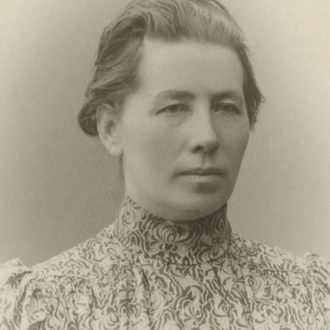
المؤلفة الفنلندية مينّا كانث تمكنت وحققت
في خلال حياتها المهنية واسعة النطاق واللاحقة، دافعت مينّا كانث عن حقوق المرأة والقضايا الاجتماعية. ولا يزال إرثها باقيًا؛ حيث يتم الاحتفال بيوم مينّا كانث سنويًا في يوم ميلادها الموافق 19 مارس.
مينّا كانث (1844–97)، التي يُعترف بها على نطاق واسع كأول امرأة كاتبة عظيمة، وُلدت حاملة اسم أولريكا ويلهلمينا جونسون في تامبيري. تتضمن أعمالها المتنوعة قصصًا قصيرة وروايات ومسرحيات إلى جانب كتابات صحفية؛ وكانت تكتب بشكل رئيسي باللغة الفنلندية وأيضًا باللغة السويدية. ناصرت حقوق المرأة والحركة النسائية، وصورت القضايا الاجتماعية في كتاباتها وخطابها.
عاشت هي وزوجها يوهان فرديناند كانث (1836–79)، في يوفاسكولا، وكان لديهما سبعة أطفال. وبعد وفاته، أصبحت سيدة أعمال، وأصبحت مالكة لمتجر لتجارة الأقمشة في كوبيو. وقد سمح لها هذا بالاستقلال المالي لأسرتها بينما تُشارك أيضًا في المشاهد الأدبية والنشاط الاجتماعي؛ وأصبح منزلها مكانَ تَجَمُّعِ المثقفين والفنانين.
وصف المؤلف جوانا هولمستروم مينّا كانث في أحدث عمود على الموقع الإلكتروني لشركة الإذاعة الوطنية الفنلندية Yle، بأنها “حقًا واحدة من الأشخاص الذين شاركوا في إرساء أسس الثقافة في فنلندا”. ويستمد هولمستورم الإلهام من نضال كانث من أجل حقوق المرأة، بينما يُلاحظ أن الكفاح لم ينته بعد، على الرغم من التقدم الذي تم إحرازه.
“يجب على كل جيل أن يخوض معركته الخاصة ليدفع بالمساواة للأمام، وهذا ما نحن فيه الآن. فغالبًا ما ننسى أن مكاسبنا التي حققناها بصعوبة يمكن أن تختفي في غمضة عين إذا كنا نلتفت إلى الوراء ونفكر في أنفسنا، “لقد تم حل كل المشاكل بالفعل!”
كُتب بواسطة طاقم عمل ThisisFINLAND (بما في ذلك الترجمات)، مارس 2017، تحديث مارس 2018
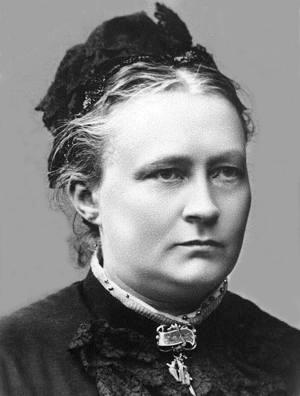
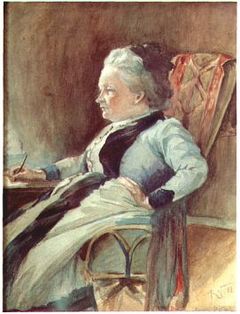
Minna Canth
From Wikipedia, the free encyclopedia
Jump to navigationJump to search
“Canth” redirects here. For other uses, see Acanthus.
Minna Canth
MinnaCanth.jpg
Portrait of Minna Canth by Kaarlo Vuori
Born 19 March 1844
Tampere, Finland
Died 12 May 1897 (aged 53)
Kuopio, Finland
Occupation writer
Spouse(s) Johan Ferdinand Canth (1835–1879)
Parent(s) Gustaf Vilhelm Johnson
Lovisa Ulrika Archelin
Minna Canth (IPA [minna ka:nt], born Ulrika Wilhelmina Johnson, 19 March 1844 – 12 May 1897)[1] was a Finnish writer and social activist. Canth began to write while managing her family draper’s shop and living as a widow raising seven children. Her work addresses issues of women’s rights, particularly in the context of a prevailing culture she considered antithetical to permitting expression and realization of women’s aspirations. Her play The Pastor’s Family is her best known. In her time, she became a controversial figure, due to the asynchrony between her ideas and those of her time, and in part due to her strong advocacy for her point of view.
Minna Canth is the first woman to receive her own flag day in Finland, starting on 19 March 2007. It is also the day of social equality in Finland.
Life and career
Canth was born in Tampere to Gustaf Vilhelm Johnsson (1816–1877) and his wife Ulrika (1811–1893). His father worked at James Finlayson’s textile factory initially as a worker and later as a foreman. Gustaf and Ulrika had four children, Minna included, of whom the eldest, Adolf, died in infancy. Minna’s surviving siblings were Gustaf (1850–1894) and Augusta (1852–1877). In 1853 his father was given charge of Finlayson’s textile shop in Kuopio and the entire family relocated there.[2]
Canth received an exceptionally thorough education for a working-class woman of her time. Even before moving to Kuopio she had attended school at Finlayson’s factory which was intended for the workers’ children. In Kuopio she continued to go to various girls’ schools and as a testament to her father’s success as a shopkeeper, she was even admitted into a school intended for upper class children. In 1863 she began her studies at the recently founded Jyväskylä Teacher Seminary, which was the first school in Finland to offer higher education for women.[3]
In 1865 she married her natural sciences teacher, Johan Ferdinand Canth, and had to drop out of the Seminary. Between 1866 and 1880 she gave birth to seven children and began her writing career at the newspaper Keski-Suomi, where her husband worked as an editor. She wrote about women’s issues and advocated temperance. In 1876 the Canths were forced to leave the paper because Minna’s writings had roused some bad blood; they were, however, both employed by the competing Päijänne the following year. Minna published her first works of fiction on the pages of Päijänne: various short stories, which were compiled in her first book, Novelleja ja kertomuksia, in 1878.[1][4]
Debate
Canth stood out when there was public debate about women’s rights. In 1885 a Bishop had argued that God’s order required that women were not emancipated. The writer Gustaf af Geijerstam then argued that men could only aspire to one day have the purity of women because they were fundamentally different and this was the reason for prostitution and other immorality, Canth objected strongly to this argument as it meant that men could defend their poor morals by reference to their implicit shortcomings, whereas any women involved in prostitution would lack the same defence.[5]
Most important works
This section does not cite any sources. Please help improve this section by adding citations to reliable sources. Unsourced material may be challenged and removed. (March 2020) (Learn how and when to remove this template message)
Minna and Johan Ferdinand Canth in Jyväskylä, where Minna lived until the death of her husband.
Minna Canth’s most important works are the plays Työmiehen vaimo (The Worker’s Wife) from 1885 and Anna Liisa, penned in 1895.
In Työmiehen vaimo, the main character Johanna is married to Risto, an alcoholic who wastes all his wife’s money. Johanna cannot prevent him – her money is legally his, not hers. The play’s premiere caused scandal, but a few months later, parliament enacted a new law about separation of property.
Anna Liisa is a tragedy about a fifteen-year-old girl who gets pregnant without being married – she manages to hide her pregnancy, and when the child is born, she suffocates it in a fit of panic. Her boyfriend Mikko’s mother helps her – she buries the baby in the woods, but a few years later, when Anna Liisa wants to marry her fiancé Johannes, she is blackmailed by Mikko and his mother. They threaten her to reveal her dark secret if she does not agree to marry Mikko, but Anna Liisa refuses. In the end, she decides to confess what she has done. She is taken to prison, but is much relieved after owning up and seems to have found peace.
Tribute
On 19 March 2017, Google celebrated her 173rd birthday with a Google Doodle.[6]
Translations
Canth, Minna: The Burglary and The House of Roinila. Translated into English by Richard Impola. Aspasia Books, Beaverton 2010.
Further reading
Sirkka Sinkkonen, editor (1986) Toward equality: proceedings of the American and Finnish Workshop on Minna Canth, Kuopio, 19 to 20 June 1985. University of Kuopio. ISBN 951-780-823-2.
